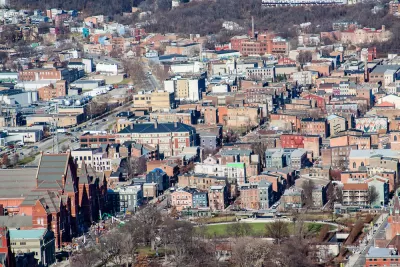For low-income renters, security deposits can be a hurdle they cannot overcome. Cincinnati's “renters’ choice” program aims to help with that challenge by providing alternatives to traditional security deposits.

"In April this year, [Cincinnati] became the first city in the U.S. to require landlords to accept alternatives to a security deposit. Cincinnati’s bold move has been hailed as a way to disrupt a broken system for renters. Other cities and states are now also offering deposit alternatives to make housing more accessible to low-income renters," reports Liza Ramrayka.
The challenge of coming up with the cash for a security deposit is one that many low-income and homeless residents face. During the pandemic, the increase in evictions and job losses in Cincinnati and other cities across the country have made security deposits even more of an issue.
"Cincinnati’s renters’ choice legislation applies to all landlords with 25 units or more and offers three options: an insurance premium, in which the tenant pays a small monthly, nonrefundable fee instead of an upfront deposit; an installment plan to spread the deposit equally over six months (or more if the landlord agrees); or a reduced security deposit, paid upfront, of no more than half the monthly rent," says Ramrayka.
Some landlords argue that dealing with an insurance plan is onerous and costly and that the focus on larger buildings means tenants have fewer options. But supporters say the program will benefit residents most in need of housing assistance. "Cincinnati’s legislation is part of a wider movement to disrupt what is arguably an outdated system, particularly where low-income housing is scarce," adds Ramrayka.
FULL STORY: Cincinnati’s Bold New Law Could Help Renters Survive The Eviction Crisis

Planetizen Federal Action Tracker
A weekly monitor of how Trump’s orders and actions are impacting planners and planning in America.

Congressman Proposes Bill to Rename DC Metro “Trump Train”
The Make Autorail Great Again Act would withhold federal funding to the system until the Washington Metropolitan Area Transit Authority (WMATA), rebrands as the Washington Metropolitan Authority for Greater Access (WMAGA).

DARTSpace Platform Streamlines Dallas TOD Application Process
The Dallas transit agency hopes a shorter permitting timeline will boost transit-oriented development around rail stations.

Renters Now Outnumber Homeowners in Over 200 US Suburbs
High housing costs in city centers and the new-found flexibility offered by remote work are pushing more renters to suburban areas.

The Tiny, Adorable $7,000 Car Turning Japan Onto EVs
The single seat Mibot charges from a regular plug as quickly as an iPad, and is about half the price of an average EV.

Supreme Court Ruling in Pipeline Case Guts Federal Environmental Law
The decision limits the scope of a federal law that mandates extensive environmental impact reviews of energy, infrastructure, and transportation projects.
Urban Design for Planners 1: Software Tools
This six-course series explores essential urban design concepts using open source software and equips planners with the tools they need to participate fully in the urban design process.
Planning for Universal Design
Learn the tools for implementing Universal Design in planning regulations.
Municipality of Princeton
Roanoke Valley-Alleghany Regional Commission
City of Mt Shasta
City of Camden Redevelopment Agency
City of Astoria
Transportation Research & Education Center (TREC) at Portland State University
US High Speed Rail Association
City of Camden Redevelopment Agency
Municipality of Princeton (NJ)





























